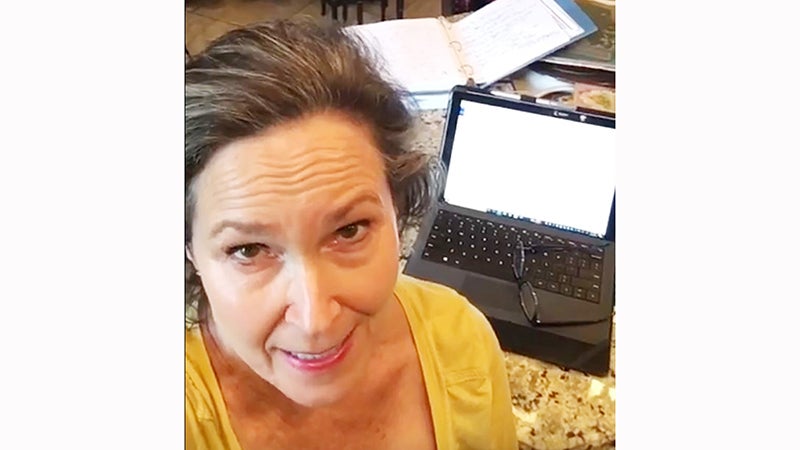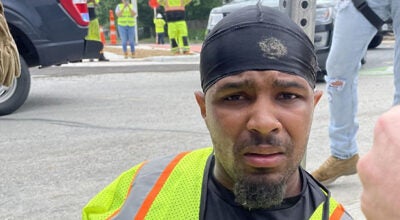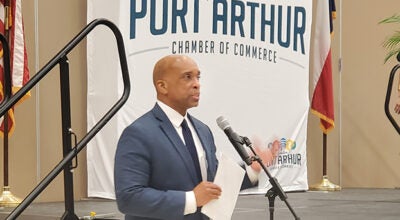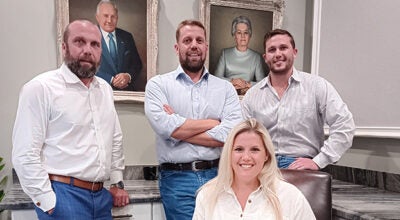LSCPA faculty, students approach virtual education with creativity
Published 12:17 am Thursday, April 16, 2020

- English instructor Dr. Michelle Judice offers encouragement and assignments to her students at Lamar State College Port Arthur via her YouTube channel. The school began teaching all its classes online March 23 as a COVID-19 precaution. (Courtesy photo)
|
Getting your Trinity Audio player ready...
|
“Show your work” has taken on a whole new meaning at Lamar State College Port Arthur.
For cosmetology students, they demonstrate 90-degree haircuts on family members who are self-quarantining from the COVID-19 virus while another family member films the process. Finally, they upload the video to their instructors who watch it in their homes and grade the work.
A nursing student goes online to show the proper way to change a bandage and start an IV, using a teddy bear.
Faced with the challenges of an almost entirely online teaching experience, students and instructors are becoming creative and adaptive in order to finish the Spring 2020 semester.
English professor Dr. Michelle Judice said the rapid mid-March transition from classroom teaching to online instruction caught everyone by surprise.
“Some of my students were scared and skeptical in the beginning,” Judice said. “But, as I bluntly told them, so was I, and I reassured them that we would figure it out together. I promised I would try my hardest but they had to do their part also.
“I’m pretty proud of how well this has come together for my classes.”
LSCPA announced on March 13 it was extending spring break for students another week while its employees prepared to move all teaching onto the Internet.
The backbone for the move was an educational software system called Blackboard, one that has been adopted by 75 percent of all U.S. colleges and universities and many public school systems.
“Some of my instructors knew Blackboard from teaching online,” said Sheila Guillot, chair of business and industrial technology. “They knew how to convert their materials online.
“I had nine of 20 instructors who had never taught online, so we showed them how to change their classes to Blackboard classes, how to upload videos. Our Process Technology instructors had never been online. We spent that week videotaping them. My faculty took to it like ducks to water. They have rolled with the punches getting everything online for the students.”
Blackboard is far from the only online technology platform being used to shorten the distance between classroom and students.
“You’ve got Zoom, Loom, YouTube, Google Teams and Skype, and all these organizations have been very helpful,” says Julie Stamey, instructor for Upward Mobility, a year-long nursing program that allows Licensed Vocational Nurses to move up to Registered Nurses.
“We’re using every available program that’s out there,” she said.
Morgan Chaddick teaches Heating, Ventilation and Air Conditioning to students seeking a one-year certification or a two-year associate’s degree.
He also runs an HVAC company in Starks, Louisiana, just across the state line.
Online teaching is new to him.
“Blackboard used to be something extra you could do. Now it’s our whole survival kit,” he said.
Chaddick has been challenged because teaching students how to safely work around high voltage electric lines is not something he can assign as a homework project. And they can’t get to his lab.
“My students hate this [separation]. They love being in class. We have the same group of students, normally, for four semesters. They become friends and now they miss the camaraderie,” Chaddick said. “It’s very important to keep them motivated. I call and text message them several times a week. I say, ‘We’ll get back to a normal flow, but right now, let’s just power through this.’ As soon as I hang up, you can see they go online, watch the videos, do the assignments. I can tell how many times they click and access stuff. Keeping in contact is kind of a simple thing.”
Availability is one of the tenets that President Dr. Betty Reynard and other administrators have preached to their teachers.
Availability & flexibility
Flexibility is not a word nursing programs are noted for.
“Because we’re running a nursing program, there’s a high level of personal responsibility that you can’t slack on,” said Deborah Lawson, a vocational nursing instructor. “You can’t graduate a bunch of nurses who don’t have their act together. But if a student is having problems, we’re making exceptions.”
Guillot said she assisted one student who lacked a computer by checking one out of the library and getting him a free Internet connection offered by Spectrum.
Two students were on 15-day lockdown at their plant jobs when schools restarted in late March and she helped them catch up.
Lawson said her department had accepted late assignments on occasion from students who had encountered difficulty uploading their papers and presentations.
“When I left the campus, the best instruction I got was that we make our assignments very clear so the students knew what was required of them,” Lawson said, “and that we be accessible, flexible, personable and compassionate.”
Stamey, an Upward Mobility instructor, said many of the 50 LVNs in her program are being called upon to work more hours than ever during the ongoing health crisis.
“People I know who are not with the school are saying to me all the time, ‘You must be taking a vacation,’ because campus is closed,” Stamey said. “I’m working harder now than I ever have. And for our students, this course is challenging already, but add to that their employers – hospitals – are wanting them to work as much as possible, plus they’re trying to keep up with their schoolwork and they’re having to teach their own kids at home.
“We’re trying to be as compassionate as we can. But at the end of the year, they’re going to have to pass the state board exams.”
Judice, the host of YouTube’s Dr Judice: EnglishProf, reminded students recently they are within a month of the Spring 2020 finish line.
“English may be more conducive for this medium than other subject areas are,” she said, looking back at the change. “My students have accessed their classes, done the work, and for the most part I believe they are doing as well as they would have done face-to-face.”





